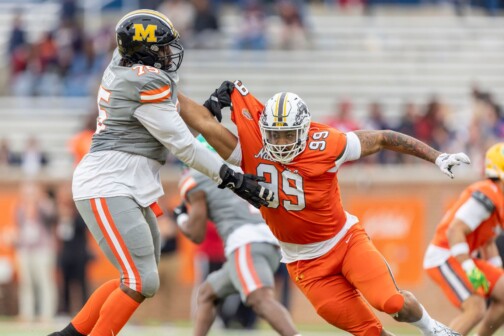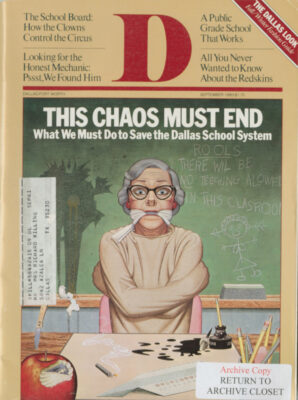Nobody has written the definitive biography of Lyndon B. Johnson. Not yet, anyway. A few writers have stepped up to take their swings, but nobody has hit much more than a scratch single. There are hopes that Ronnie Dugger, the founding editor of the Texas Observer, will deliver a late-inning surprise. But we’ve been waiting close to a dozen years for Dugger to deliver; more and more, one wonders whether he’ll even show up at the ballpark.
Merle Miller has not written the definitive LB J book; the only Texan to become President requires much more interpreting than this book gives us. Miller has been content to turn on his tape machine in the presence of LBJ’s old pals and associates and a few former enemies, to listen to oral histories on file at the LBJ Library in Austin, and to wade through -looking for quotes – all the books, articles, and scholarly papers he could find about this fascinating, vulgar, compassionate, and complex man whom everyone recalls as “larger than life.”
This is not to belittle the result of Miller’s five years of work. Lyndon (G.P. Putnam’s Sons, $17.95) is an interesting book and a valuable one. It contains raw material for future historians to weigh, assay, chew, and digest. But for all its merits and titillations it remains a series of snapshots – some of them candid, some of them posed -rather than a finished portrait we might hang above the mantel and then step back to say Yes, yes, that’s him; that’s ol’ Lyndon awright; it’s as good a likeness as we’re likely to get.
Lyndon Johnson has not been gone long enough – either from the White House or from this earth -to permit writers to capture him fully or to assess the long-range results of what he did or failed to do. We have not yet come to the sort of general historical consensus that causes former Presidents to be ranked ultimately at the top, in the middle, or in the lower groupings. Oh, we know he’ll rank far above the likes of Millard Fillmore and Rutherford B. Hayes, just as we know he’ll rank a few rungs below Lincoln and Jefferson. “Between ninth and twelfth, I think,” Bill Porterfield wrote at the time of Johnson’s death. “Somewhere in there among Grover Cleveland, James K. Polk, and Dwight Eisenhower.”
But Porterfield’s is a contemporary guess, not a judgment tested by time. The latter may be given only when all the rocks are turned over, when the private journals go public, when seated documents and tapes are free of their 30- to 50-year restrictions, when passions have cooled, and memories are no longer intimidated by fear of retribution.
From about 1971 to 1976, I engaged in a futile attempt to write that “definitive” LBJ book before finally, and wisely, throwing up my hands and walking away. I wanted to get him all, and all was not yet there. I have a drawer full of notes, prejudices, and notions. Mainly, however, I have disappointments, frustrations, and regrets. I found, on approaching LBJ’s former associates, that many were not ready to tell truth-with-the-bark-off. Not yet -not with LBJ alive or recently dead, not with Lady Bird and the daughters around to put the gimlet eye on those who perhaps might remember or confess too much. Many 1 approached were saving for their own books those little dollops and secrets making up history; I hope they tell them for history’s sake when the heat’s off and they are ready for retirement and dread nothing but death. But while such people continue to work as lawyers, lobbyists, ) and politicians they are going to ! be discreet. They also are likely ; to justify much of what LBJ did because they, too, were in or the doing and want to look good. That is why right now nobody, Merle Miller included, is going to produce an LBJ book that makes headline news by naming old girl friends or maybe telling that LBJ got drunk one night and used the hot line to threaten Moscow.
Yet Miller’s oral history has changed at least one important concept I had of LBJ during his retirement years. Everything I had read, and most of the people I talked with who saw him in the post-Presidential period – Senator McGovern, Bobby Baker, Doris Kerns, and a few reluctant to speak for the record -painted a picture of a bit ter, morose, paranoid old man who felt betrayed by his closer associates and worried that the Communists had penetrated his White House staff. I have no doubt h< harbored such sentiments, at least in odd moments. But from the testimony found in Lyndon, I am ready to believe that he lived a happier retirement than that, that he died not as pained or haunted as one had previously thought. Those staffers, ranch hands and neighbors who saw him from day to day-as well as John Connally and Congressman Jake Pickle and other old friends and even some random tourists -are persuasive in that regard.
One must remember, of course, that LBJ was the consummate actor -and so played different roles to different people as the mood or the relationship struck him. He had, too, such wide swings of mood -now up, now down-as to almost classically define the manic-depressive. So probably he was not consistent even when not acting. But I feel good somehow, knowing that the old scamp lived out his life and died less the grouch and whiner than I had formerly suspected. It makes me think better of him.
Indeed, Lyndon Johnson comes off a bit nobler in this oral history than one expected. The passage of time did that (and perhaps having since viewed in the White House such as Nixon, Ford, and Carter). How many times have you heard lately, “I never thought I’d say it, but ol’ Lyndon’s looking better all the time.” I have heard variations on that theme everywhere from Odessa truck stops to the watering holes of Manhattan’s limousine liberals.
Time and distance are slowly freeing even the most loyal of LBJ men to make their reappraisals. Jack Valenti, who for years almost laughably seemed to confuse his boss man with God, now can step back and admit “he was a mean bully when he wanted to be and he could humiliate you, both publicly and privately. He would castigate you for being one millimeter off in what you were doing. I don’t understand it, and I never will … [sometimes] … his eyes would narrow to slits, and the force would then gather in the room, and you would know you were treading on dangerous territory.” Hubert Humphrey, George Reedy, LBJ’s younger brother, Sam Houston Johnson, and other subordinates are on the record here with remembrances of LBJ’s uglier moments.
Yet, too, I see in Lyndon a President who was more “presidential” – more responsible and more responsive, less flaky and flashy-than I have seen before. The intelligent voices of Harry McPherson, John Kenneth Galbraith, Roger Wilkins, and Bill Moyers-as well as less famous figures who saw and heard the President discuss and formulate policy -permit glimpses of LBJ in his better, calmer, ana more rational moments. He does not come off as blustery, stiff, or phony as he often did on televisio
The truth is, in this big sprawl of a book you can find just about any Lyndon Johnson you’re looking for. He was a man of many parts, a true eccentric. Listen to Coates Redmond, widow of the late Hayes Redmond, a White House staffer: “I don’t remember what year it was, but one day Hayes, my husband, came home laughing himself sick, saying ’You wouldn’t believe what I saw.’ He explained that he had said to Bill Moyers, ’Gee, I never get to see the President when he’s doing those outrageous things everyone tells me about. And the next time he does one, 1 want to be in on it. I’m working for the man and I want to see this.’
“So one day Bill telephoned him to come quick to the President’s bedroom. I think Lynda Bird was in there, and Mrs. Johnson, and Marie Fehmer was taking dictation. The President was lying on his side in his bed and facing the group. There was a nurse on the other side, the three television sets were all going, and he was going snap, snap, snap. He’s batting dictation to Marie, he’s switching the channels, he’s yelling at Bill-and I think there were others there, someone from the networks and another from the White House staff-and he’s yelling at them too. And everybody in this fairly large group was acting normal as all get-out. And Hayes said that he started to walk around a little, because he couldn’t figure out what the nurse was doing there. Bill said, ’Can’t you see?’ Hayes said, ’No, I can’t see anything.’ But little by little it was getting apparent, and Bill whispered to him, ’Well, you wanted a good one, you got a good one-he’s having an enema.’ “
Oh, Lordy, there won’t never be another one ..
Those who like their stories to be simple, progressive narratives may be put off by the hop-skip-and-a-jump technique Merle Miller uses. At the same time, his technique will be cheered by historians and scholars attempting to study any single facet of the man. As a reader, 1 am a bit put off by the jerky rhythms; as a writer, I cheer the convenience of finding what I want to find in this book quickly.
The one criticism 1 would make is offered more in sorrow than in anger: I wish Miller had given us the benefit of what he personally makes of the man he studied for five years. I wish he had been more passionate, subjective, and judgmental. But then, perhaps that is my LBJ book to write. Until I do, read Merle Miller’s. You’ll learn, you’ll be amused, and sometimes you’ll feel disbelieving. I think you’ll always be interested.
Get our weekly recap
Brings new meaning to the phrase Sunday Funday. No spam, ever.
Related Articles

Restaurants & Bars
The Best Japanese Restaurants in Dallas
The quality and availability of Japanese cuisine in Dallas-Fort Worth has come a long way since the 1990s.
By Nataly Keomoungkhoun and Brian Reinhart

Home & Garden
One Editor’s Musings on Love and Letting Go (Of Stuff, That Is)
Memories are fickle. Stuff is forever. Space is limited.
By Jessica Otte

Football
The Cowboys’ Draft Class Is Heavy on Athleticism and Heavier on Beef
Dallas entered the weekend needing help on both lines. It exited with plenty of fresh faces to plug those gaps.
By Dan Morse


